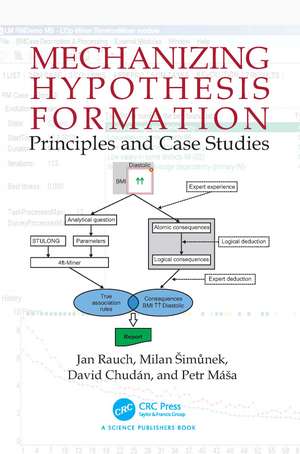Mechanizing Hypothesis Formation: Principles and Case Studies
Autor Jan Rauch, Milan Šimůnek, David Chudán, Petr Mášaen Limba Engleză Paperback – 9 oct 2024
The book covers a brief overview of logic of discovery. Many examples of applications of the GUHA procedures to solve real problems relevant to data mining and business intelligence are presented. An overview of recent research results relevant to dealing with domain knowledge in data mining and its automation is provided. Firsthand experiences with implementation of the GUHA method in the Python language are presented.
| Toate formatele și edițiile | Preț | Express |
|---|---|---|
| Paperback (1) | 362.66 lei 6-8 săpt. | |
| CRC Press – 9 oct 2024 | 362.66 lei 6-8 săpt. | |
| Hardback (1) | 1160.88 lei 6-8 săpt. | |
| CRC Press – 20 oct 2022 | 1160.88 lei 6-8 săpt. |
Preț: 362.66 lei
Preț vechi: 464.39 lei
-22% Nou
Puncte Express: 544
Preț estimativ în valută:
69.46€ • 71.56$ • 58.18£
69.46€ • 71.56$ • 58.18£
Carte tipărită la comandă
Livrare economică 22 februarie-08 martie
Preluare comenzi: 021 569.72.76
Specificații
ISBN-13: 9780367549824
ISBN-10: 0367549824
Pagini: 362
Ilustrații: 446
Dimensiuni: 156 x 234 mm
Greutate: 0.67 kg
Ediția:1
Editura: CRC Press
Colecția CRC Press
Locul publicării:Boca Raton, United States
ISBN-10: 0367549824
Pagini: 362
Ilustrații: 446
Dimensiuni: 156 x 234 mm
Greutate: 0.67 kg
Ediția:1
Editura: CRC Press
Colecția CRC Press
Locul publicării:Boca Raton, United States
Public țintă
AcademicCuprins
1. Introduction 2. Data Sets SECTION I: THE GUHA PROCEDURES 3. Principle and Simple Examples 4. Common Features 5. LISp-Miner System SECTION II: APPLYING THE GUHA PROCEDURES 6. Examples Overview 7. 4ft-Miner – GUHA Association Rules 8. CF-Miner – Histograms 9. KL-Miner – Pairs of Categorical Attributes 10. SD-4ft-Miner – Couples of GUHA Association Rules 11. SDCF-Miner – Couples of Histograms 12. SDKL-Miner – Couples of Pairs of Categorical Attributes 13. Ac4ft-Miner – Action Rules 14. GUHA Procedures and Business Intelligence 15. CleverMiner – GUHA and Python SECTION III: RELATED RESEARCH AND THEORY 16. Artificial Data Generation and LM ReverseMiner Module 17. Applying Domain Knowledge 18. Observational Calculi
Notă biografică
Jan Rauch graduated from the Faculty of Mathematics and Physics of Charles University in Prague. He received his Ph.D. in Mathematical Logic in 1987 from the Institute of Mathematics of the Czechoslovak Academy of Sciences. He is a full professor at the Department of Information and Knowledge Engineering, Prague University of Economics and Business since 2011.
Milan Šimůnek is an associate professor (since 2012) at the Faculty of Informatics and Statistics, Prague University of Economics and Business. His research activities include data mining, databases, virtual reality and software projects development. He is the software project leader of the LISp-Miner system since its launch in 1996 and author of its core-modules implementation.
David Chudán is an assistant professor of Applied Informatics at the Faculty of Informatics and Statistics, Prague University of Economics and Business. He received his Ph.D. in 2015 in the field of Applied informatics. His research interests include data mining and machine learning on different tools and platforms. Another research area is GUHA association rules and their complementary usage with business intelligence.
Petr Máša graduated from the Prague University of Economics and Business and the Faculty of Mathematics and Physics of Charles University in Prague. He received his Ph.D. in 2006. He also works on business projects where he uses data mining, data science, data analytics and he is also business responsible.
Milan Šimůnek is an associate professor (since 2012) at the Faculty of Informatics and Statistics, Prague University of Economics and Business. His research activities include data mining, databases, virtual reality and software projects development. He is the software project leader of the LISp-Miner system since its launch in 1996 and author of its core-modules implementation.
David Chudán is an assistant professor of Applied Informatics at the Faculty of Informatics and Statistics, Prague University of Economics and Business. He received his Ph.D. in 2015 in the field of Applied informatics. His research interests include data mining and machine learning on different tools and platforms. Another research area is GUHA association rules and their complementary usage with business intelligence.
Petr Máša graduated from the Prague University of Economics and Business and the Faculty of Mathematics and Physics of Charles University in Prague. He received his Ph.D. in 2006. He also works on business projects where he uses data mining, data science, data analytics and he is also business responsible.
Descriere
The GUHA is a method of mechanizing hypothesis formation. The input of the GUHA procedure consists of analysed data and several parameters defining a large set of relevant patterns. The output is a representation of a set of all relevant patterns satisfying the given true condition.
